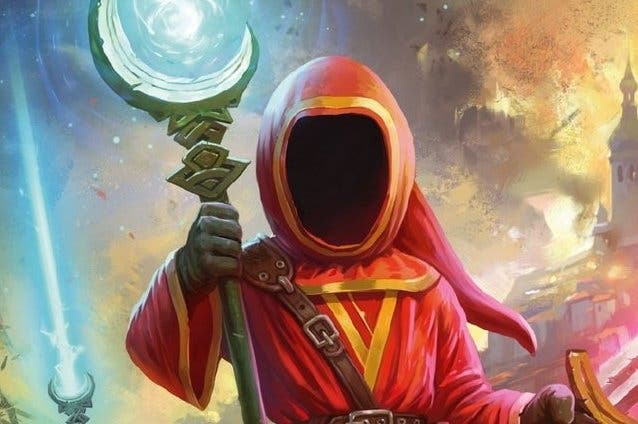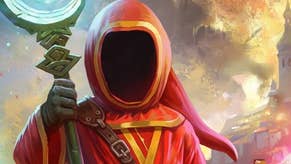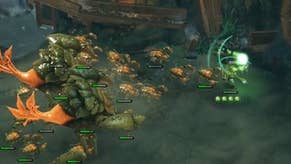Magicka 2 review
Serious wizness.
Few games have understood magic - the wizardly, fantasy, fetch-me-some-sparrow-entrails kind of magic - quite as perfectly as Magicka did. Magicka grasped that real magic should be creative, rigorous, elemental, and only barely controlled. It should shudder beneath your feet and leave you drained. It should require a perfect balance of dexterity and imagination and an understanding of the strange, unshakable laws that underpin the whole thing. Inevitably, Magicka's innate brilliance has been both a blessing and a curse.
It's been a blessing because few games provide this kind of immediate thrill: magic broken down into eight elements that can be combined into complex, devastating spells at a moment's notice. An entire gaming arsenal unlocked from the start - every trick in the book available as long as you have the imagination to work them out. Cast water and fire to make steam. Sure, that's cooking rather than magic, really. But fire and earth to make fireballs? That's magic, and it's just the first step. Death lightning! Ice shotguns! You're doing all this on the hoof, too, in the heat of magical combat, with no obvious mana pools to worry about, just the flexibility of your fingers and the speed of your wits.
But the curse? Eight elements and a bunch of ways to cast them meant that hacking through Magicka was a bit like learning to play an instrument. It was an investment, and it could be exhausting. I'm fine with that, personally, but I can see why people were put off, or why they felt Magicka was mocking and intentionally awkward. More importantly, Magicka took this beautiful sandbox magic system and then it didn't really know what to do with it. It stuck it into a top-down shooter, albeit a disguised one, and strung a campaign across pretty but rather inert fantasy worlds filled with charmingly lame jokes. Co-op brought the thing to hectic, knockabout life, of course, but there was still the sense of a missed opportunity - even if it's not clear exactly what that opportunity could have been. There's still the sense that Magicka's central premise was just too good for the entirely decent game built around it. Perhaps it was too good for any game. That's magic for you.
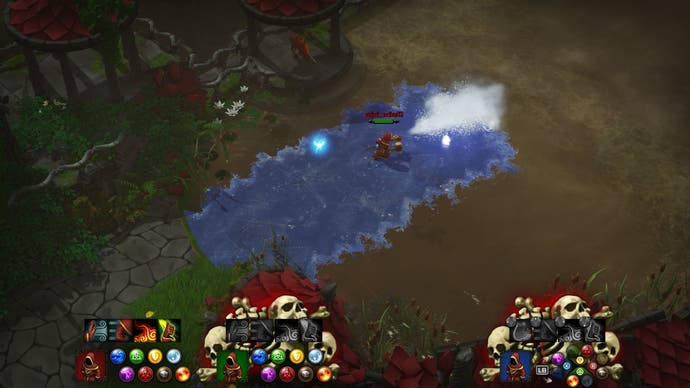
Magicka 2 is very nearly a more-of-the-same sequel, so it shouldn't be too surprising that most of these problems remain. The campaign's shorter this time, but it can still feel like a masochistic grind if you're playing solo, and while co-op is as hilarious as it ever was (Magicka is proof positive that co-op games should almost always include friendly fire - and then combine it with actual fire) it's still pretty simple stuff. A silly narrative interspersed with wave after wave of foes and the odd boss. Horde-type challenges, trials and a neat artifact system that allows you to add modifiers to make the game harder or just stranger on subsequent playthroughs. All of this is enriched by local and online co-op, and it takes place against familiarly bucolic fantasy landscapes - a bit icier and cavier this time, perhaps - that feel as flimsy and lifeless as a Lord of the Rings-themed coconut shy. The approach to magic still shines - and it still hasn't found the game that will truly do it justice.
There have been some changes, a few of them welcome. First up, I think, is what feels like a quiet rebalancing of the spells, moving away from 10 or 15 super-powered attacks that have you covered for most of the game, and towards weaker, more targeted elemental tricks that you'll need to switch between as you face foes whose shifting immunities force you from any comfort zones, and who are increasingly able to fling fairly complex stuff back at you too. On top of this, you can move as you cast spells now, which adds to a greater sense of fleet-footed dynamism and allows later levels to really pile on the damage, culminating in a final boss fight that is probably the most imaginative piece of enemy design the series has yet seen. (Even better, you can fight each other endlessly through the final credit roll.)
Elsewhere, as the game lands on PS4 the controller support has been tidied up to the point where it's now a viable option, even if it still feels like heresy. The new system elegantly ditches the right-stick nuttiness of the first Magicka and maps all eight elements to the face buttons, requiring the use of the left bumper to switch between two groups of four. Other bumpers, triggers and sticks control whether you cast the spell you've just made on yourself, as an area effect, on your weapon, or as a ranged attack. It's as straightforward as Magicka's going to get - which, thankfully, isn't very straightforward at all.
(The choice of eight elements themselves remain unchanged, incidentally, and you can still string them together into spells of up to five parts, bearing in mind that some of the pieces will cancel each other out. You're still as much a danger to yourself as you are to anyone nearby, too. This is a game for people who delight in blowing themselves up, accidentally lighting themselves on fire, or frying their own innards with electricity.)
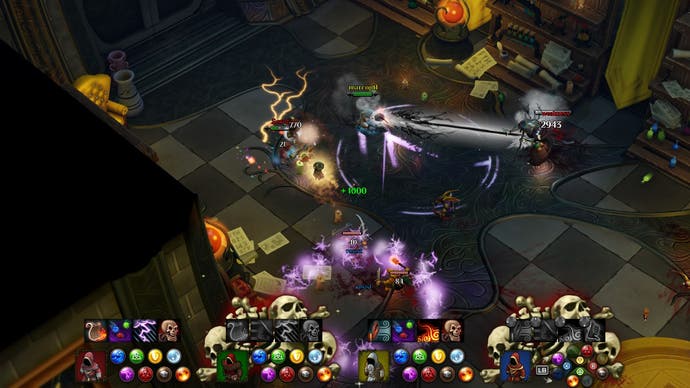
Magicks have been altered too, although the change is largely optional. Magicks are set-piece spells that, at the lame end of the spectrum, cover crap like reviving or providing a magical shove, but scale quickly to encompass flaming attacks by orbiting dragons and bringing in the classic English power of rainstorms. Mr Norrell would be proud. Because magicks are more powerful than ordinary combinations - or at least more useful - they are often a lot more complex to dial-in. That's the point, of course, but Magicka 2 adds to the old system with a Diablo-style hotbar that allows you to choose four favourite magicks that can be cast at the press of a button. The price for this is a cooldown - a cooldown that doesn't exist if you conjure the spell the old-fashioned way.
It's a clever trade-off, but it speaks to a game that's pitching itself at two distinct audiences. It also just feels weird from a philosophical standpoint. No matter how committed you are to the old way of doing things, the hotbar tempts you to sidestep the wonderful speed-dexterity challenge that ultimately defines Magicka, while the cooldown feels like an abstraction in a game that was formerly blessedly free of abstractions - a game that presented a rather daunting meritocracy, really, allowing you access to everything from the start, and letting you use it again and again as often as you could conjure it.
All of which adds to the feeling that Magicka 2 is less interested in taking the template somewhere new and exciting as it is in reeling the whole thing back in and attempting to rebuild the original game along slightly different lines, while covering much of the same ground. Throw in a handful of weird little omissions - the absence of a multiplayer game browser, the inability to remap keys on PC (the latter is being patched, apparently, and might be in by the time you read this) - and you have a sequel which doesn't provide quite enough of a meaningful progression in any manner that actually makes you excited. Magicka 2 is a lovely, chaotic multiplayer game, but so was the first - and the first felt distinct in ways that a follow-up can't hope to recapture.
The opportunity here was to bundle up the wild brilliance of Magicka and finally deliver a campaign that was as exciting and unpredictable and astonishing as the powers you have at your disposal. Maybe next time.
